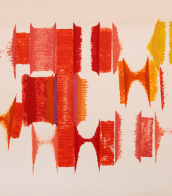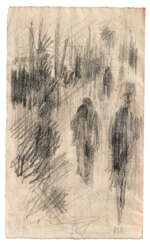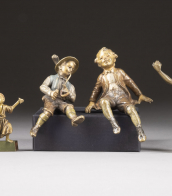medardo rosso (1858 - 1928)
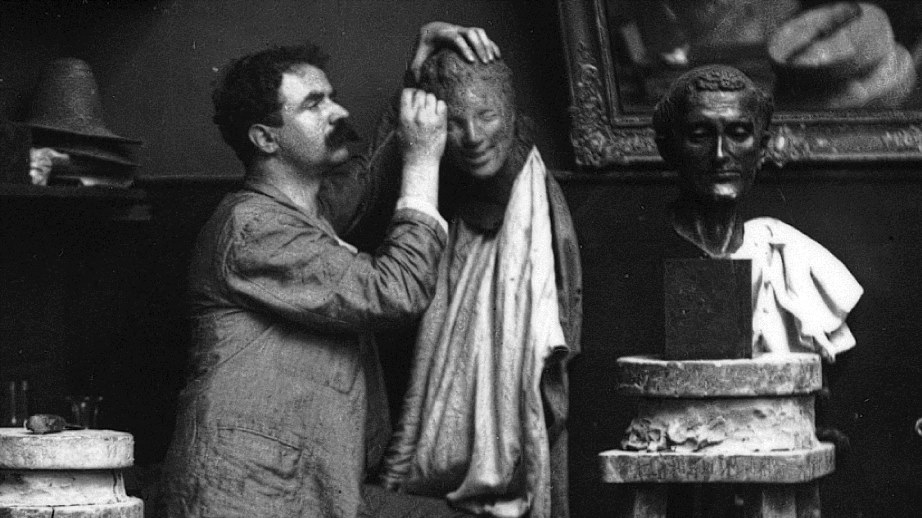
Medardo Rosso was an Italian and French post-impressionist sculptor.
In 1884, Rosso was expelled from the Brera Academy for negatively influencing fellow students because he rejected the rigors of academic art. At his first premiere at the World Exhibition in Paris in 1889, Medardo Rosso caused a sensation. His success, however, later led to creative jealousy on the part of the undisputed master sculptor Auguste Rodin and the severing of their former friendship.
Like the Impressionist painters of his time, Rosso sought to capture in his work the subtle features of everyday modern life and the immediate, elusive sensations of light and movement. Details in his sculptures are usually subordinated to texture, suggestion and effect, and the features of portraits emerge as if from the shadows, as in The Lady with the Veil of 1893.
In 1896, Rosso opened his own foundry and art workshop in Paris, was well acquainted with many of the famous writers and artists of the time and created their sculptural portraits. He also became interested in photography, which was fashionable at the time. In 1902, Rosso took French citizenship. He worked hard and his work had an indelible influence on many of the futurist artists of Europe who were contemporary to him.
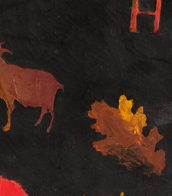

Medardo Rosso was an Italian and French post-impressionist sculptor.
In 1884, Rosso was expelled from the Brera Academy for negatively influencing fellow students because he rejected the rigors of academic art. At his first premiere at the World Exhibition in Paris in 1889, Medardo Rosso caused a sensation. His success, however, later led to creative jealousy on the part of the undisputed master sculptor Auguste Rodin and the severing of their former friendship.
Like the Impressionist painters of his time, Rosso sought to capture in his work the subtle features of everyday modern life and the immediate, elusive sensations of light and movement. Details in his sculptures are usually subordinated to texture, suggestion and effect, and the features of portraits emerge as if from the shadows, as in The Lady with the Veil of 1893.
In 1896, Rosso opened his own foundry and art workshop in Paris, was well acquainted with many of the famous writers and artists of the time and created their sculptural portraits. He also became interested in photography, which was fashionable at the time. In 1902, Rosso took French citizenship. He worked hard and his work had an indelible influence on many of the futurist artists of Europe who were contemporary to him.
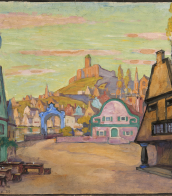

Medardo Rosso was an Italian and French post-impressionist sculptor.
In 1884, Rosso was expelled from the Brera Academy for negatively influencing fellow students because he rejected the rigors of academic art. At his first premiere at the World Exhibition in Paris in 1889, Medardo Rosso caused a sensation. His success, however, later led to creative jealousy on the part of the undisputed master sculptor Auguste Rodin and the severing of their former friendship.
Like the Impressionist painters of his time, Rosso sought to capture in his work the subtle features of everyday modern life and the immediate, elusive sensations of light and movement. Details in his sculptures are usually subordinated to texture, suggestion and effect, and the features of portraits emerge as if from the shadows, as in The Lady with the Veil of 1893.
In 1896, Rosso opened his own foundry and art workshop in Paris, was well acquainted with many of the famous writers and artists of the time and created their sculptural portraits. He also became interested in photography, which was fashionable at the time. In 1902, Rosso took French citizenship. He worked hard and his work had an indelible influence on many of the futurist artists of Europe who were contemporary to him.


Medardo Rosso was an Italian and French post-impressionist sculptor.
In 1884, Rosso was expelled from the Brera Academy for negatively influencing fellow students because he rejected the rigors of academic art. At his first premiere at the World Exhibition in Paris in 1889, Medardo Rosso caused a sensation. His success, however, later led to creative jealousy on the part of the undisputed master sculptor Auguste Rodin and the severing of their former friendship.
Like the Impressionist painters of his time, Rosso sought to capture in his work the subtle features of everyday modern life and the immediate, elusive sensations of light and movement. Details in his sculptures are usually subordinated to texture, suggestion and effect, and the features of portraits emerge as if from the shadows, as in The Lady with the Veil of 1893.
In 1896, Rosso opened his own foundry and art workshop in Paris, was well acquainted with many of the famous writers and artists of the time and created their sculptural portraits. He also became interested in photography, which was fashionable at the time. In 1902, Rosso took French citizenship. He worked hard and his work had an indelible influence on many of the futurist artists of Europe who were contemporary to him.
